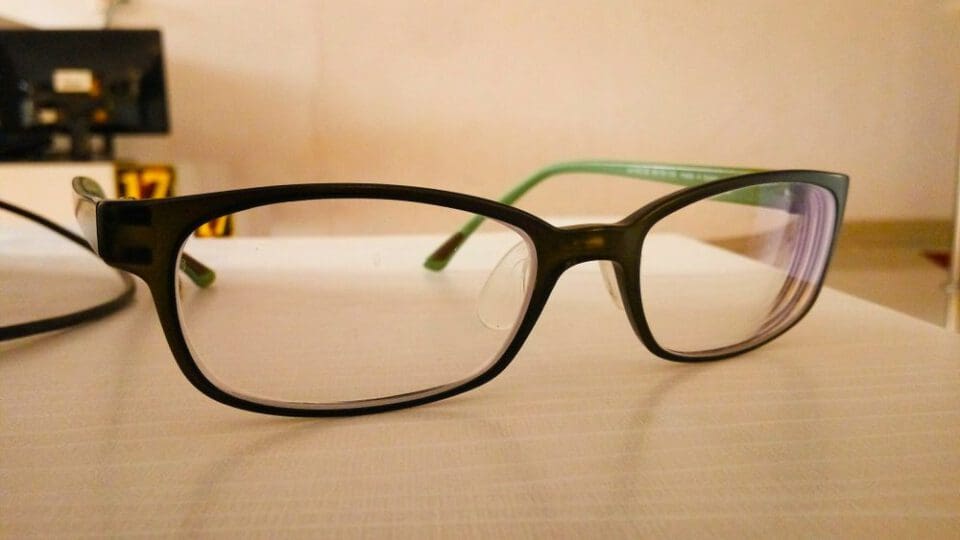Further Reading
Will HD Glasses Improve Your Vision?
Home / Everything About Glasses /
Last Updated:
HD glasses are a significant advancement in the world of eye health, but they are not miraculous. They are high-quality glasses that can often provide crisp vision.
If your eye health is poor, they will generally not help you much more than a pair of conventional prescription glasses would. If you already have experience with corrective lenses, expect them to work similarly, but perhaps slightly better due to higher quality manufacturing.
Ultimately, talk to your doctor about what to expect, so you can avoid disappointment if the change is minor.
Table of Contents
High-definition (HD) glasses are made with a modern manufacturing technique that involves scanning the eye to produce a pair of lenses ideal for the user. Created with a level or precision and customization not previously possible, HD glasses are usually at least marginally better than conventional lenses.
HD glasses generally cost about 25 to 30 percent more than conventional glasses. Inquire beforehand to see if your insurance company will cover them.
This higher cost may not be worth it for everyone, as it is rarely essential to upgrade to HD glasses. If you can safely see and are happy with your vision, you can skip HD glasses without much detriment.
People who already achieve 20/20 vision with corrective lenses but have problems with glare or visual distinction are most likely to benefit from HD glasses. At the same time, just about anybody who uses prescription lenses should see some benefit, if minor, to their visual experience with HD glasses.
Maintain realistic expectations when buying HD glasses. They will not make your vision perfect if similar but conventional prescription lenses were unable to do so.
At the end of the day, HD glasses are still eyeglasses and cannot solve all vision problems. Talk to your doctor about what to expect when purchasing HD glasses, especially given their moderately high cost.
There is not much hard data on HD glasses at this time. Minimal academic research has been performed comparing conventional glasses to HD options. Consumers and prescribers would benefit from more research.
At the same time, there is little reason to believe HD glasses do not provide some benefit. The manufacturing process is legitimate, and the science behind them is sound.
What Are HD Glasses?
High-definition (HD) glasses are marketed more or less as the glasses of the future. This claim is not entirely unwarranted.

Among these types of lenses, free-form lenses are the most popular. While complex in practice, free-form is essentially a manufacturing process that uses highly precise machines controlled by computers. Compared to the way standard prescription lenses are manufactured, free-form lenses tend to be better crafted, at least minutely, in essentially every way.
You deserve clear vision. We can help.
With 135+ locations and over 2.5 million procedures performed, our board-certified eye surgeons deliver results you can trust. Your journey to better vision starts here.
There is also a newer type of HD lenses being produced called wavefront lenses. These lenses are customized even further to a person’s individual needs. A specialized instrument receives a wavefront of light by sending uniform light waves into your eye. This allows a manufacturer to get an extremely detailed evaluation of all your eye’s optical imperfections, thus allowing for more or less the ideal modern lens for you.
Factors considered during the manufacturing process (some of which are considered in the manufacturing of standard glasses) include:
- The shape of the patient’s eyes and the position of their pupils.
- The distance the lenses will generally sit from the eyes.
- The angle the eye will look through a particular part of the lens if the user shifts their gaze.
- The size of the frames the lenses will be put into.
While many steps of the manufacturing process use highly precise, computerized machinery, HD glasses are not electronic. The end result is a high-quality pair of lenses, used just like any other pair of prescription lenses. Their higher cost may warrant more careful use and storage, however.
Who Are HD Glasses For?
Almost anyone who needs glasses is a good candidate for HD glasses, but they are best suited for people who can achieve 20/20 vision with corrective wear. The comparatively minor change from conventional corrective wear to HD corrective wear generally becomes most apparent at higher levels of visual fidelity.
If you are bothered by glare or feel your vision might be indistinct despite having achieved 20/20 vision with glasses, it could benefit you to ask your doctor about HD glasses.
HD glasses cut down on the distortions and glare more common among conventional lenses. If you have been frustrated by these issues, the moderately increased cost of HD glasses could very well be worth the improvement in your quality of life.
Healthy Expectations

HD glasses are a significant advancement in the world of eye health, but they are not miraculous. They are high-quality glasses that can often provide crisp vision.
If your eye health is poor, they will generally not help you much more than a pair of conventional prescription glasses would. If you already have experience with corrective lenses, expect them to work similarly, but perhaps slightly better due to higher quality manufacturing.
Ultimately, talk to your doctor about what to expect, so you can avoid disappointment if the change is minor.
How Do You Buy HD Glasses?
You can buy glasses with HD lenses from most optometrists and retailers that sell glasses with prescription lenses. Different retailers may also call them digital lenses or have a special brand name for their HD lenses.
You can order HD glasses online or in-store depending on the retailer you choose. Since not all retailers offer HD lenses, it may be easier to stick to online shopping in this case.
You deserve clear vision. We can help.
With 135+ locations and over 2.5 million procedures performed, our board-certified eye surgeons deliver results you can trust. Your journey to better vision starts here.
Cost of HD Lenses
The cost of HD lenses can vary significantly depending on what type your need and where you purchase them.
Do your research and make sure you have compared prices. Your eye doctor’s office is always valuable resource and can likely help you find HD lenses at a competitive price.
Popular HD Glasses Brands
There are many optical companies making lenses for HD glasses right now. Some of the most popular include:
Each of these brands has certain features that set its lenses apart. For example, Shamir’s Autograph line uses artificial intelligence (AI) to give customers a greater level of personal precision in their lenses.
Most retailers that sell HD glasses get their lenses from one of these providers. If you’re interested in getting a specific brand of lenses, be to ask your provider which brand they use. You may also be able to find this information on their website.
More Research Needed
HD glasses largely came onto the medical scene between 2011 and 2012. Since then, minimal research has been performed comparing them to traditional lenses. Given their higher cost and the presently high reliance on mostly anecdotal evidence of their quality, consumers and prescribers alike would benefit from academic research into their quality.
It is very unlikely such research would debunk the claims being made. The science behind HD glasses’ manufacture is fairly well understood and quite sound. Negative feedback about the lenses, beyond some discussion around cost, tends to also be rare.
Still, hard data would help people make more informed decisions.
You deserve clear vision. We can help.
With 135+ locations and over 2.5 million procedures performed, our board-certified eye surgeons deliver results you can trust. Your journey to better vision starts here.
References
- HD Glasses & Lenses. LensCrafters.
- High-Definition Eyeglass Lenses. (August 2017). All About Vision.
- HD Lenses Explained. (April 2014). JCPenney Optical.
- How to Get the Best Eyeglass Lenses. (December 2016). Consumer Reports.
- Progressive Lenses Explained: Pros, Cons, Options. (June 2021). Vint and York.
- Eyeglass & Contact Lens Store Buying Guide. (July 2021). Consumer Reports.
- Costco Optical. (2021). Costco.
- Lenses. (2021). Axis Optical.
- Varilux Progressive Lenses¦Essilor. (2021). Essilor of America.
- ZEISS Digital Lenses. (2021). ZEISS International.
- Shamir Progressive Lenses. (2021). Shamir Optical Industry.
- Digital Lenses¦Hoya Vision. (2021). Hoya Vision.
This content is for informational purposes only. It may have been reviewed by a licensed physician, but is not intended to serve as a substitute for professional medical advice. Always consult your healthcare provider with any health concerns. For more, read our Privacy Policy and Editorial Policy.